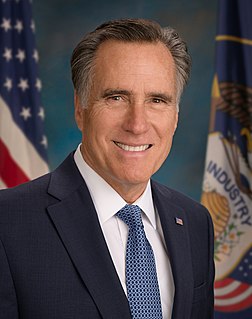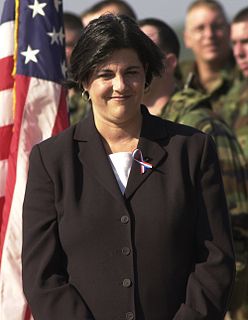
Shannon Patricia Elizabeth O'Brien is a Democrat from Massachusetts. O'Brien served in the Massachusetts House of Representatives from 1987 through 1993, in the Massachusetts Senate from 1993 through 1995, and was the Massachusetts State Treasurer from 1999 through 2003. In that last position she became the first woman to be elected in Massachusetts to statewide office by her own accord. She was the Democratic Party nominee in the Massachusetts gubernatorial election, 2002, but lost in the general election to Mitt Romney.

The Massachusetts gubernatorial election of 2006 was held on November 7, 2006. Incumbent Republican governor Mitt Romney chose to not seek a second term, and the election was won by Democratic former United States Assistant Attorney General Deval Patrick. Patrick became the second African-American governor in the United States since Reconstruction.

The Mitt Romney presidential campaign of 2008 began on January 3, 2007, two days before Mitt Romney left office as governor of Massachusetts, when he filed to form an exploratory committee with the Federal Election Commission to run for President of the United States as a Republican in the 2008 election. Subsequently, on February 13, 2007, he formally announced his candidacy for the Republican nomination for president in 2008. He did so at the Henry Ford Museum and Greenfield Village in Dearborn, Michigan, as an emblem of American ingenuity.
The political positions of Mitt Romney have been recorded from his 1994 U.S. senatorial campaign in Massachusetts, the 2002 gubernatorial election, during his 2003–2007 governorship, during his 2008 U.S. presidential campaign, in his 2010 book No Apology: The Case for American Greatness, during his 2012 U.S. presidential campaign, and during his 2018 senatorial campaign in Utah. Some of these political positions have changed, while others have remained unchanged.

This the electoral history of Mitt Romney, the 70th Governor of Massachusetts (2003–2007) and a candidate for: the United States Senate in 1994 and President of the United States in 2008 and 2012. In 2018, Romney declared that he was a candidate for the United States Senate in the state of Utah.

The 2012 United States presidential election was the 57th quadrennial American presidential election, held on Tuesday, November 6, 2012. The Democratic nominee, President Barack Obama, and his running mate, Vice President Joe Biden, were elected to a second term. They defeated the Republican ticket of businessman and former Governor Mitt Romney of Massachusetts and Representative Paul Ryan of Wisconsin.

The Massachusetts gubernatorial election of 2010 was held on November 2, 2010. Incumbent Democratic Governor Deval Patrick was re-elected to a second term.

A Massachusetts general election was held on November 5, 2002 in the Commonwealth of Massachusetts.
Peter Forman is President and CEO of the South Shore (MA) Chamber of Commerce. He was formerly an American politician who served as a member of the Massachusetts House of Representatives, Sheriff of Plymouth County, Massachusetts, and as a member of the Paul Celucci and Jane M. Swift administrations.

The 2012 United States presidential election in New Hampshire took place on November 6, 2012, as part of the 2012 United States presidential election in which all 50 states plus The District of Columbia participated. New Hampshire voters chose four electors to represent them in the Electoral College via a popular vote pitting incumbent Democratic President Barack Obama and his running mate, Vice President Joe Biden, against Republican challenger and former Massachusetts Governor Mitt Romney and his running mate, Congressman Paul Ryan.

The 2012 United States presidential election in Washington took place on November 6, 2012, as part of the 2012 General Election in which all 50 states plus The District of Columbia participated. Washington voters chose 12 electors to represent them in the Electoral College via a popular vote pitting incumbent Democratic President Barack Obama and his running mate, Vice President Joe Biden, against Republican challenger and former Massachusetts Governor Mitt Romney and his running mate, Congressman Paul Ryan.

The 2012 United States presidential election in North Carolina took place on November 6, 2012, as part of the 2012 General Election in which all 50 states plus The District of Columbia participated. North Carolina voters chose 15 electors to represent them in the Electoral College via a popular vote pitting incumbent Democratic President Barack Obama and his running mate, Vice President Joe Biden, against Republican challenger and former Massachusetts Governor Mitt Romney and his running mate, Congressman Paul Ryan.

This article lists possible candidates for the Republican nomination for Vice President of the United States in the 2012 election. On May 29, 2012, former Governor Mitt Romney of Massachusetts won a majority of pledged delegates for the Republican nomination for President of the United States, and became the presumptive nominee.

The 2013 United States Senate special election in Massachusetts was held on June 25, 2013, in order to fill the Massachusetts Class 2 United States Senate seat for the remainder of the term ending January 3, 2015.

The 2018 Massachusetts gubernatorial election took place on November 6, 2018, to elect the governor and lieutenant governor of the Commonwealth of Massachusetts. Republican Governor Charlie Baker and Lieutenant Governor Karyn Polito sought reelection to a second term in office, facing Democratic challengers Jay Gonzalez and Quentin Palfrey, respectively. Candidates were selected in the primary election held on September 4, 2018.

























